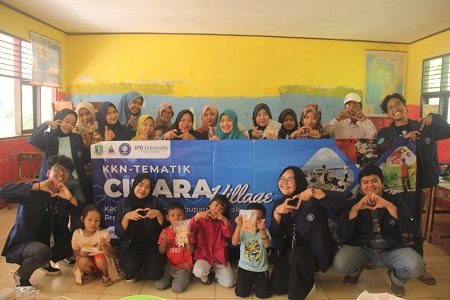IPB University Innovation KKN-T Students Invite Cihara Village Community to Do Patin Fish Nugget Business

IPB University students from the Thematic Real Work Lecture (KKN-T) program provided training on catfish nugget processing to the people of Cihara Village, Banten. This activity was organized because there are still obstacles in marketing fresh catfish in Cihara Village.
"The fishy smell of catfish makes it difficult for us to find distribution markets or buyers. It makes some of us feel tired and demoralized," said Oji, a catfish farmer in Cihara Village.
Based on these problems, IPB University Innovation KKN-T students in Cihara Village came up with an innovative way to provide villagers with the knowledge and skills to process catfish into value-added products that can increase their income. In addition, the processed catfish nugget product can be an alternative and variation of a healthy and nutritious menu to meet the daily nutritional needs of village children.
In this training, KKN-T Innovation IPB University students taught the community the basic techniques of processing catfish into nuggets. The nugget-making process begins with the selection of high quality fresh catfish. The catfish is cleaned and filleted, then mashed and mixed with other ingredients such as wheat flour, garlic, salt, sugar, chicken stock and pepper.
The dough is placed on a baking sheet and steamed for about 20 minutes or until cooked. The steamed dough is then sliced to taste. The cooked dough is then dipped in beaten eggs and sprinkled with breadcrumbs for further frying.
The trainees were also given information on hygienic packaging of the product with vacuum plastic to make the product more durable and uncontaminated.
"After the IPB University Innovation KKN-T students visited me as a catfish farmer and then demonstrated the production of nuggets to the community, my spirit reappeared. The students were able to prove that the processed catfish tastes good, is tasty, delicious and does not smell fishy. Thank you, students, for helping us," Oji continued.
The training was attended by dozens of Cihara villagers who were eager to learn. Dedeh, a representative of the village's Family Welfare Empowerment (PKK), expressed her excitement about the training.
"I used to think that catfish was only good for frying. After the socialization of IPB University students, I learned that catfish can be processed into various dishes, including nuggets. I hope that after understanding the proper processing methods, I will be able to consume catfish for personal consumption as well as sell it to neighbors or in the market," she said.
In addition, Ahmad, as the Head of Section (Kasi) of Economy and Development (Ekbang) of Cihara Village, expressed his gratitude to his fellow IPB students for providing guidance and training to the residents of Cihara Village.
Dr Steven Solikin as the field supervisor was proud of the innovation of IPB University students, because it could help the people of Cihara Village in developing their economic business.
"The innovation of KKN-T students to support the potential of fisheries and food diversification indirectly shows the commitment of IPB University to help the community manage resources optimally by increasing the selling value of catfish," said Dr Steven.
According to him, this activity is also in line with IPB University's vision to support one of the points in the Sustainable Development Goals (SDGs), namely SDGs 2 Zero Hunger. (KES/RAT/Rz) (IAAS/SHY)



